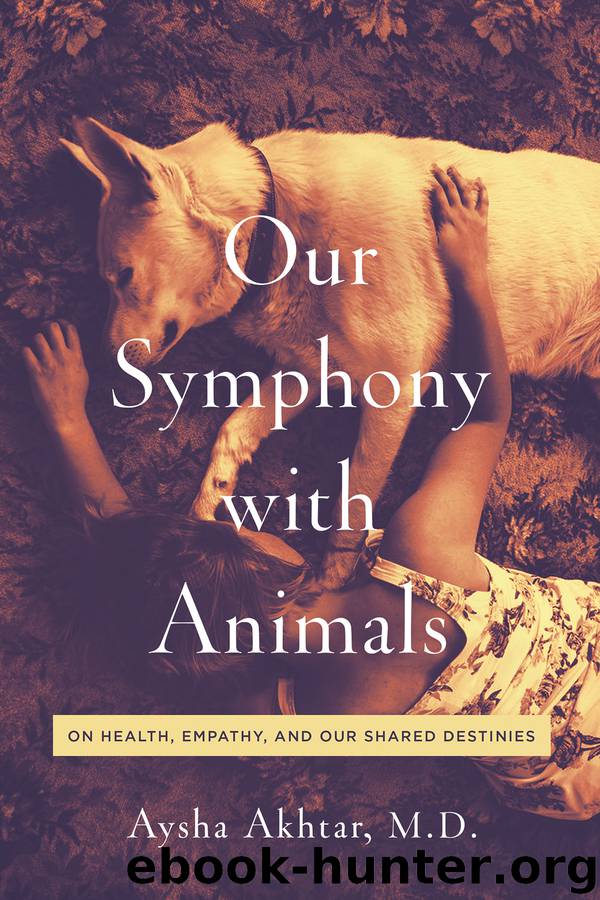Our Symphony with Animals by Aysha Akhtar

Author:Aysha Akhtar
Language: eng
Format: epub
Publisher: Pegasus Books
Published: 2019-03-03T16:00:00+00:00
Who is an animal?
Humans are, of course. Though we do our best to deny this. Putting that aside, who an animal is depends in part on what state he or she happens to live in.
Oregon says an animal is “any nonhuman mammal, bird, reptile, amphibian or fish.” Missouri defines them as “every living vertebrate except a human being.” That leaves out crabs, octopi, and lobsters, who are animals the last time I checked my biology books. I can’t figure out the rationale behind Texas’s definition: “a domesticated living creature, including any stray or feral cat or dog, and a wild living creature previously captured.” Not included are never-captured wild living animals (basically all wildlife) or cows, goats, pigs, and chickens, who are defined not as animals but as “livestock animals.”
We can’t really blame the states for being so confused in determining just who is an animal. The writers of the Animal Welfare Act (AWA) can’t figure this out either. The AWA is the “only Federal law in the United States that regulates the treatment of animals in research, exhibition, transport, and by dealers.” The AWA defines an animal as “any live or dead dog, cat, monkey (nonhuman primate mammal), guinea pig, hamster, rabbit, or such other warm-blooded animal, as the Secretary may determine is being used, or is intended for use, for research, testing, experimentation, or exhibition purposes, or as a pet; but such term excludes (1) birds, rats of the genus Rattus, and mice of the genus Mus, bred for use in research, (2) horses not used for research purposes, and (3) other farm animals such as, but not limited to, livestock or poultry, used or intended for use as food or fiber, or livestock or poultry, used or intended for use for improving animal nutrition, breeding, management, or production efficiency, or for improving the quality of food or fiber.” That’s a brainteaser.
Fortunately, states may define animals more broadly than the authors of the AWA. New York defines animals as “every living creature except a human being.” In New York, then, the raccoon that the Super allegedly killed is indeed an animal. That means the Super can be found to have broken the law.
The next question that follows is what kind of law did the Super break? According to New York State law, anyone who “tortures or cruelly beats or unjustifiably injures, maims, mutilates or kills any animal, whether wild or tame . . .” is guilty of a class A misdemeanor. The penalty for a misdemeanor is up to one year in jail and/or a fine not to exceed $1,000. Regardless of how the Super may have hurt and killed the raccoon, the maximum offense he could face is a misdemeanor.
Let’s say the raccoon wasn’t a raccoon, but a dog instead. In this case, the Super could be charged with aggravated cruelty, which occurs when a person “with no justifiable purpose . . . intentionally kills or intentionally causes serious physical injury” to an animal. Aggravated cruelty to animals is a felony with a maximum imprisonment of two years.
Download
This site does not store any files on its server. We only index and link to content provided by other sites. Please contact the content providers to delete copyright contents if any and email us, we'll remove relevant links or contents immediately.
The Lonely City by Olivia Laing(4802)
Animal Frequency by Melissa Alvarez(4474)
All Creatures Great and Small by James Herriot(4322)
Walking by Henry David Thoreau(3962)
Exit West by Mohsin Hamid(3828)
Origin Story: A Big History of Everything by David Christian(3692)
COSMOS by Carl Sagan(3625)
How to Read Water: Clues and Patterns from Puddles to the Sea (Natural Navigation) by Tristan Gooley(3469)
Hedgerow by John Wright(3363)
How to Read Nature by Tristan Gooley(3341)
The Inner Life of Animals by Peter Wohlleben(3319)
How to Do Nothing by Jenny Odell(3302)
Project Animal Farm: An Accidental Journey into the Secret World of Farming and the Truth About Our Food by Sonia Faruqi(3221)
Origin Story by David Christian(3202)
Water by Ian Miller(3188)
A Forest Journey by John Perlin(3077)
The Plant Messiah by Carlos Magdalena(2935)
A Wilder Time by William E. Glassley(2863)
Forests: A Very Short Introduction by Jaboury Ghazoul(2842)
